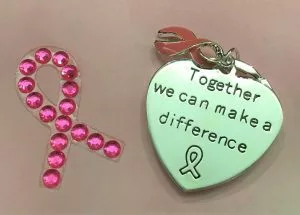
October is Breast Cancer Awareness Month, an annual health campaign that raises awareness and support for the 1 in 8 women in the United States that will develop breast cancer in her lifetime. Bringing awareness to this disease is important because breast cancer is the most common cancer in women worldwide. Sadly, on average a woman in the United States is diagnosed with breast cancer every 2 minutes. Breast cancer also impacts men, though it is rare.
Breast cancer treatment and chances for survival can vary greatly depending on the type of breast cancer and when it is diagnosed. As the more than 3.5 million breast cancer survivors in the United States today are well-aware, treatment may include surgery to remove the cancer (lumpectomy), to remove lymph nodes, or even to remove the breast entirely (mastectomy). Breast cancer treatment also frequently involves some combination of radiation therapy, chemotherapy, hormone therapy, targeted therapy drug therapy, and immunotherapy.
Although death rates have decreased since 1989, nearly 42,000 women in the United States are expected to die in 2019 from breast cancer. The decrease in death rates is believed to be the result of advances in treatment and research, earlier detection through screening, and increased awareness of the disease and its risk factors.
Early Detection Through Screening
While experts and medical organizations disagree on when women should begin regular mammograms to aid in screening for breast cancer, some general guidelines include:
Risk Factor: Exposure to Certain Chemicals
One important risk factor for developing breast cancer is exposure to chemicals. Studies have shown that exposure to the following substances, for example, may increase the risk of breast cancer in women:
Ethylene oxide is a particularly dangerous chemical and has been classified as a known human carcinogen. Many medical studies link exposure to ethylene oxide to breast cancer, among other diseases. Here in Illinois, communities have put a spotlight on one major source of ethylene oxide: commercial sterilization facilities. Commercial sterilization facilities such as Medline in Waukegan, IL, Vantage Specialties in Gurnee, IL, and Sterigenics (which operated a facility in Willowbrook, Illinois until it was recently forced to close down) use ethylene oxide to sterilize medical equipment and some food products. These companies have released ethylene oxide into the neighboring community’s air, exposing nearby workers and residents and putting them at risk. Indeed, the Illinois Department of Health studied the Willowbrook community and found significantly higher levels of breast cancer in women compared to county and state averages.
Due to the risks posed by this chemical, community activists and environmental organizations are pushing the Illinois Legislature to pass a law (“House Bill 3888”) that would ban emissions of any amount of ethylene oxide in densely populated areas. The goal of the bill is to greatly reduce exposure to this harmful carcinogen.
We stand with our clients and friends in Willowbrook and the surrounding communities who have been affected by ethylene oxide emissions and who oppose any additional emissions of this chemical into the air of densely populated communities. We encourage residents to let the Illinois legislature know how they feel about House Bill 3888 by calling or emailing their state representatives. Not sure who your state representative is? Click here to find out.
If you believe you or your family members were exposed to ethylene oxide or other chemicals and have questions about your health or legal options, please call one of the experienced environmental personal injury attorneys at The Collins Law Firm today at 630-527-1595 to protect your rights.

"*" indicates required fields